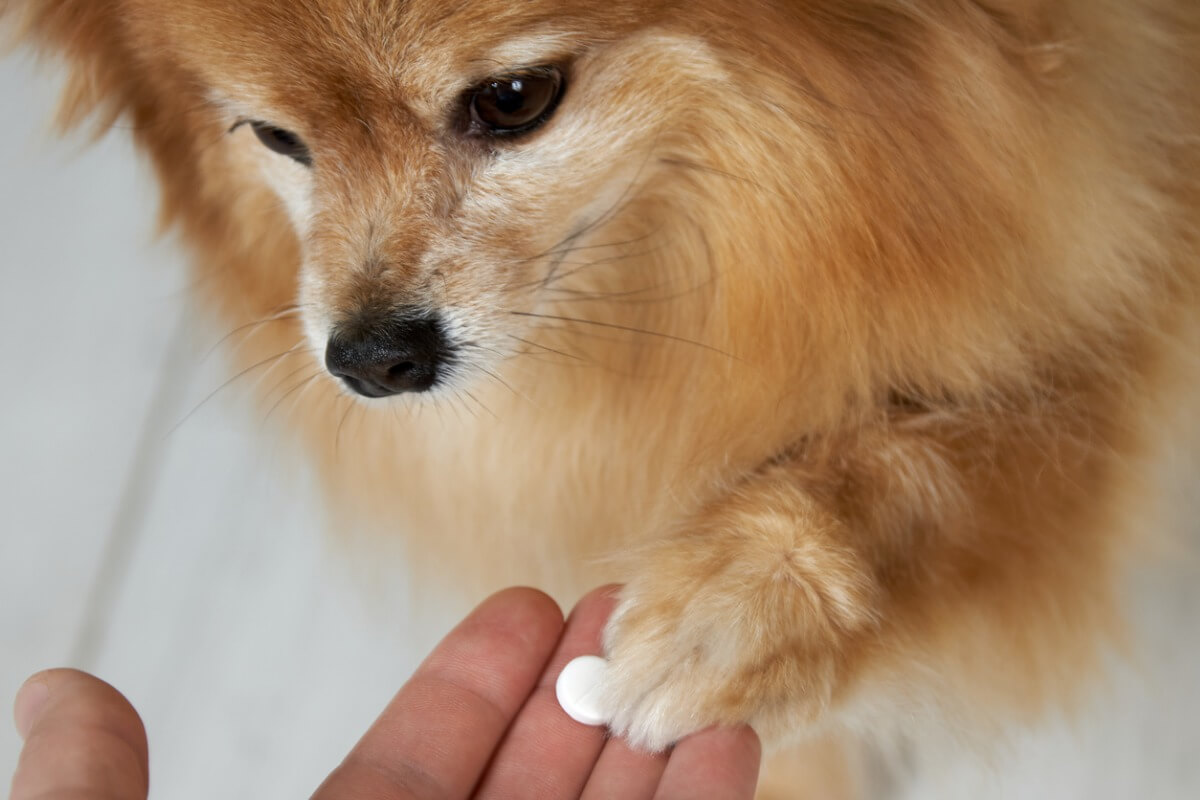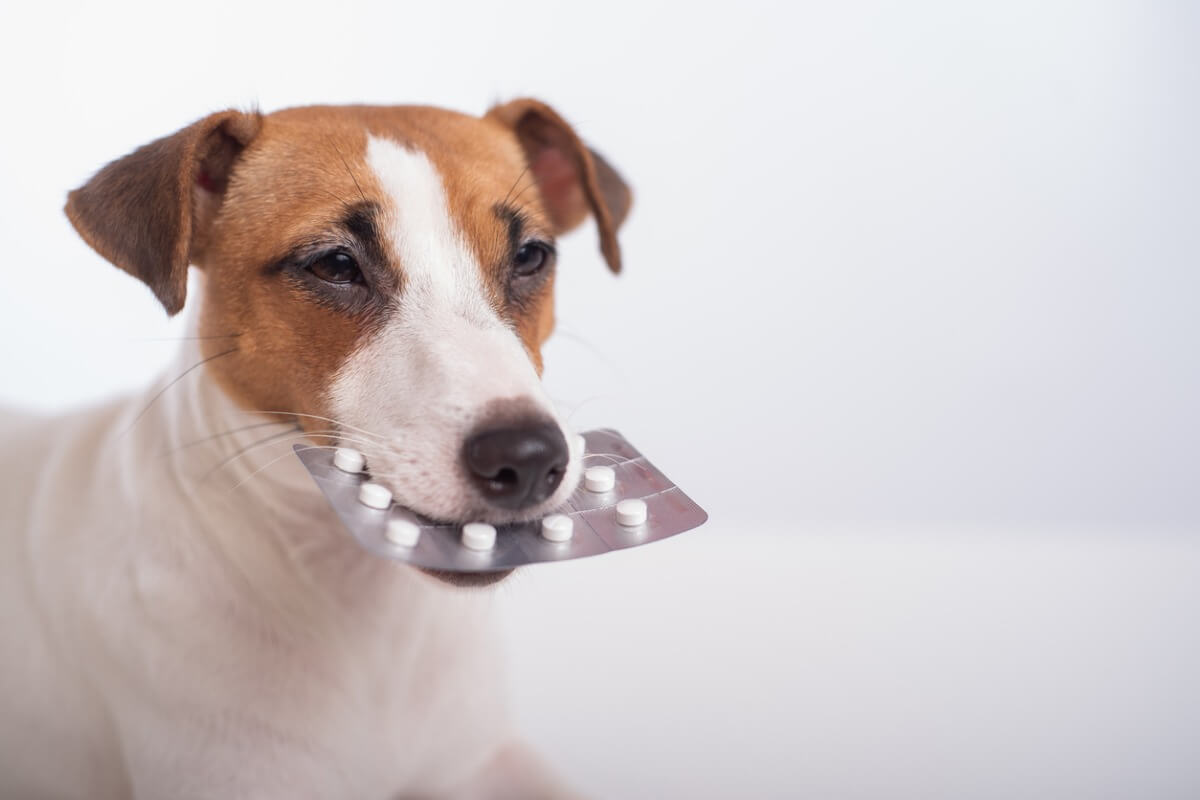Famotidine for Dogs: Uses and Dosage


Reviewed and approved by the biologist Samuel Sanchez
It’s very likely that you have famotidine in your medicine cabinet, as it’s a drug used in human medicine. If this is the case, you may be surprised to learn that there’s a version of famotidine for dogs. However, you shouldn’t give the medicine you use yourself to your pets, even if you observe that they have symptoms that seem familiar to you.
Only the veterinarian is authorized to prescribe medicines to your pets, as factors such as breed, weight, and diagnosis must be considered. So, if your dog has been prescribed famotidine, it’s normal to have questions about what it is, what it’s used for, and any risks or side effects that may occur after them taking it. Here we’ll tell you all about it!
What is famotidine for dogs?
Famotidine is a drug with an anti-ulcer effect that helps reduce the amount of stomach acid produced in the stomach. It’s part of the group of H2 receptor antagonist drugs or H2 blockers and its function is to inhibit histamine-induced gastric acid secretion.
Specifically, what this compound does is to prevent the histamine produced by the stomach cells from binding to its receptor, resulting in a decrease of the acid in question.
This drug has a great advantage, in that it’s more potent than other active ingredients such as cimetidine or ranitidine. Unfortunately, the dog version is poorly absorbed. Only 37% of famotidine in its oral form is used by the body.

Why is famotidine prescribed to dogs?
Considering that the absorption of this drug in dogs is poor, it’s normal for you to wonder why veterinarians prescribe famotidine to these animals. This is especially so when you know that there are drugs (such as omeprazole) that are more effective.
The reason is that this particular drug has fewer side effects than others, which we will discuss in more detail later. However, the vet will be the one to decide which of the two drugs to use considering the specific diagnosis in each case.
Uses of famotidine in dogs
As we could guess at this point, famotidine in dogs with diseases associated with the impact of stomach acid. According to the drug’s information sheet, it’s commonly prescribed in diagnoses of different types of gastritis, as well as in the following conditions:
- Duodenal ulcers
- Benign gastric ulcers
- Therapy to reduce the recurrence of benign duodenal or gastric ulcers
- Hypersecretory syndromes such as Zollinger-Ellison syndrome (a condition in which the body overproduces the hormone gastrin)
- Gastroesophageal reflux disease that doesn’t respond to diet or antacids
- Gastroesophageal reflux esophagitis
On the other hand, scientific studies have proven that famotidine prevents the reduction of canine gastric blood flow produced by non-steroidal anti-inflammatory drugs (NSAIDs), such as diclofenac sodium. As you can see, its applications in the veterinary field are many.
Famotidine dosage in dogs
The dosage of famotidine for dogs should be calculated by the treating veterinarian. This will be done based on the animal’s weight, as well as the particular diagnosis. The same goes for the treatment time and the frequency between each intake.
The recommended dosage is between 0.1 milligram and 1 milligram of famotidine per kilogram of weight. The professional will decide if it’s administered once or twice a day.
This drug comes in tablet form, which are offered before each meal or inside a product to prevent the dog from rejecting it or getting stressed (if it has difficulties ingesting drugs). It also comes in an oral suspension, that is, a powder to which water is added to turn it into a kind of thick syrup.
Injectable famotidine for dogs
Although it isn’t common, some veterinarians prescribe injectable famotidine, a presentation that should be applied only by a professional. It’s usually formulated for dogs that have stopped eating and who find it difficult to take their pills.
Contraindications of the drug
Like most medications for human or dog use, famotidine has its contraindications. Among them, you have to consider that it interacts with other drugs, so if your dog is taking any other medication, you should notify the treating veterinarian immediately. You should also tell them about any food or vitamin supplements.
Likewise, this drug is contraindicated in dogs that have a reported allergy to this drug and that suffer from renal or hepatic diseases. In addition, in older dogs or those with health complications, it should be administered with caution and under the strict recommendation of the vet.
It is necessary to emphasize that famotidine has no contraindications when administered to pregnant or lactating dogs.
Side effects
Although famotidine for dogs has fewer side effects than other similar drugs, the following may occur:
- A loss of appetite
- Diarrhea and vomiting
- Dry skin and mucous membranes
- Hypotension
- Decreased heart rate (when administered intravenously)
On the other hand, special care must be taken with the following symptoms because they indicate a possible overdose. In this case, the owner should seek urgent veterinary attention:
- Nervousness
- Vomiting
- Tachycardia or increased heart rate
- Collapse

Summarising the uses and risks of famotidine for dogs?
Famotidine is a drug commonly used in dogs that have problems with abnormally high stomach acid. It is used in both humans and pets, but there’s a special version for each.
It’s a drug that has to be used with caution and it should always be prescribed by an expert. Please remember that you should never medicate your pet without the approval of a vet.
It’s very likely that you have famotidine in your medicine cabinet, as it’s a drug used in human medicine. If this is the case, you may be surprised to learn that there’s a version of famotidine for dogs. However, you shouldn’t give the medicine you use yourself to your pets, even if you observe that they have symptoms that seem familiar to you.
Only the veterinarian is authorized to prescribe medicines to your pets, as factors such as breed, weight, and diagnosis must be considered. So, if your dog has been prescribed famotidine, it’s normal to have questions about what it is, what it’s used for, and any risks or side effects that may occur after them taking it. Here we’ll tell you all about it!
What is famotidine for dogs?
Famotidine is a drug with an anti-ulcer effect that helps reduce the amount of stomach acid produced in the stomach. It’s part of the group of H2 receptor antagonist drugs or H2 blockers and its function is to inhibit histamine-induced gastric acid secretion.
Specifically, what this compound does is to prevent the histamine produced by the stomach cells from binding to its receptor, resulting in a decrease of the acid in question.
This drug has a great advantage, in that it’s more potent than other active ingredients such as cimetidine or ranitidine. Unfortunately, the dog version is poorly absorbed. Only 37% of famotidine in its oral form is used by the body.

Why is famotidine prescribed to dogs?
Considering that the absorption of this drug in dogs is poor, it’s normal for you to wonder why veterinarians prescribe famotidine to these animals. This is especially so when you know that there are drugs (such as omeprazole) that are more effective.
The reason is that this particular drug has fewer side effects than others, which we will discuss in more detail later. However, the vet will be the one to decide which of the two drugs to use considering the specific diagnosis in each case.
Uses of famotidine in dogs
As we could guess at this point, famotidine in dogs with diseases associated with the impact of stomach acid. According to the drug’s information sheet, it’s commonly prescribed in diagnoses of different types of gastritis, as well as in the following conditions:
- Duodenal ulcers
- Benign gastric ulcers
- Therapy to reduce the recurrence of benign duodenal or gastric ulcers
- Hypersecretory syndromes such as Zollinger-Ellison syndrome (a condition in which the body overproduces the hormone gastrin)
- Gastroesophageal reflux disease that doesn’t respond to diet or antacids
- Gastroesophageal reflux esophagitis
On the other hand, scientific studies have proven that famotidine prevents the reduction of canine gastric blood flow produced by non-steroidal anti-inflammatory drugs (NSAIDs), such as diclofenac sodium. As you can see, its applications in the veterinary field are many.
Famotidine dosage in dogs
The dosage of famotidine for dogs should be calculated by the treating veterinarian. This will be done based on the animal’s weight, as well as the particular diagnosis. The same goes for the treatment time and the frequency between each intake.
The recommended dosage is between 0.1 milligram and 1 milligram of famotidine per kilogram of weight. The professional will decide if it’s administered once or twice a day.
This drug comes in tablet form, which are offered before each meal or inside a product to prevent the dog from rejecting it or getting stressed (if it has difficulties ingesting drugs). It also comes in an oral suspension, that is, a powder to which water is added to turn it into a kind of thick syrup.
Injectable famotidine for dogs
Although it isn’t common, some veterinarians prescribe injectable famotidine, a presentation that should be applied only by a professional. It’s usually formulated for dogs that have stopped eating and who find it difficult to take their pills.
Contraindications of the drug
Like most medications for human or dog use, famotidine has its contraindications. Among them, you have to consider that it interacts with other drugs, so if your dog is taking any other medication, you should notify the treating veterinarian immediately. You should also tell them about any food or vitamin supplements.
Likewise, this drug is contraindicated in dogs that have a reported allergy to this drug and that suffer from renal or hepatic diseases. In addition, in older dogs or those with health complications, it should be administered with caution and under the strict recommendation of the vet.
It is necessary to emphasize that famotidine has no contraindications when administered to pregnant or lactating dogs.
Side effects
Although famotidine for dogs has fewer side effects than other similar drugs, the following may occur:
- A loss of appetite
- Diarrhea and vomiting
- Dry skin and mucous membranes
- Hypotension
- Decreased heart rate (when administered intravenously)
On the other hand, special care must be taken with the following symptoms because they indicate a possible overdose. In this case, the owner should seek urgent veterinary attention:
- Nervousness
- Vomiting
- Tachycardia or increased heart rate
- Collapse

Summarising the uses and risks of famotidine for dogs?
Famotidine is a drug commonly used in dogs that have problems with abnormally high stomach acid. It is used in both humans and pets, but there’s a special version for each.
It’s a drug that has to be used with caution and it should always be prescribed by an expert. Please remember that you should never medicate your pet without the approval of a vet.
All cited sources were thoroughly reviewed by our team to ensure their quality, reliability, currency, and validity. The bibliography of this article was considered reliable and of academic or scientific accuracy.
- Bersenas, A. M. E., Mathews, K. A., Allen, D. G., & Conlon, P. D. (2005). Effects of ranitidine, famotidine, pantoprazole, and omeprazole on intragastric pH in dogs. American Journal of Veterinary Research, 66(3), 425-431. https://doi.org/10.2460/ajvr.2005.66.425
- Gollakner, R. (s.f.). Famotidine | VCA Animal Hospital. VCA. https://vcahospitals.com/know-your-pet/famotidine
- Hata, J., Kamada, T., Manabe, N., Kusunoki, H., Kamino, D., Nakao, M., Fukumoto, A., Yamaguchi, T., Sato, M., & Haruma, K. (2005). Famotidine prevents canine gastric blood flow reduction by NSAIDs. Alimentary Pharmacology and Therapeutics, 21(s2), 55-59. https://doi.org/10.1111/j.1365-2036.2005.02475.x
- Hedges, K., Odunayo, A., Price, J. M., Hecht, S., & Tolbert, M. K. (2019). Evaluation of the effect of a famotidine continuous rate infusion on intragastric pH in healthy dogs. Journal of Veterinary Internal Medicine, 33(5), 1988-1994. https://doi.org/10.1111/jvim.15558
- Henderson, A., & Webster, C. (2006). An in-depth look: The use of gastroprotectants in treating gastric ulceration in dogs. Compendium, 28(5). https://www.vetfolio.com/learn/article/an-in-depth-look-the-use-of-gastroprotectants-in-treating-gastric-ulceration-in-dogs
- Merck Sharp & Dohme. (2009). Tamin. Resumen de características del producto. Recuperado el 28 de enero de 2023, disponible en: https://botplusweb.farmaceuticos.com/documentos/2009/12/15/41476.pdf
- Takahama, H., Asanuma, H., Sanada, S., Fujita, M., Sasaki, H., Wakeno, M., Kim, J., Asakura, M., Takashima, S., Minamino, T., Komamura, K., Sugimachi, M., Kitakaze, M. (2010). A histamine H₂ receptor blocker ameliorates development of heart failure in dogs independently of β-adrenergic receptor blockade. Basic Research in Cardiology, 105(6), 787-94. https://tohoku.pure.elsevier.com/en/publications/a-histamine-hsub2sub-receptor-blocker-ameliorates-development-of-
- Tolbert, K., Bissett, S., King, A., Davidson, G., Papich, M., Peters, E., & Degernes, L. (2010). Efficacy of Oral Famotidine and 2 Omeprazole Formulations for the Control of Intragastric pH in Dogs. Journal of Veterinary Internal Medicine, 25(1), 47-54. https://doi.org/10.1111/j.1939-1676.2010.0651.x
This text is provided for informational purposes only and does not replace consultation with a professional. If in doubt, consult your specialist.








